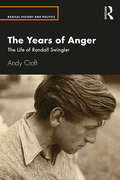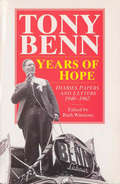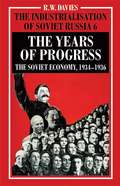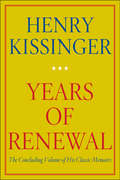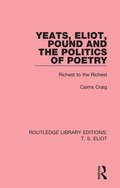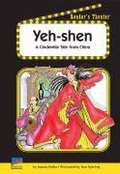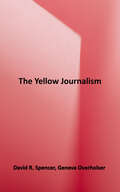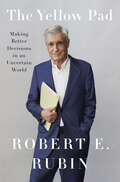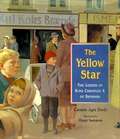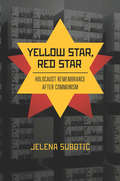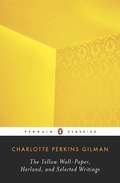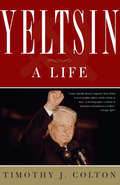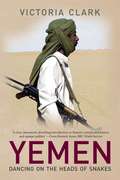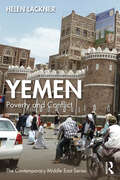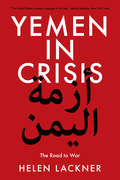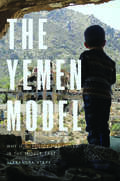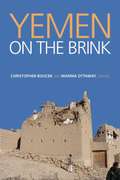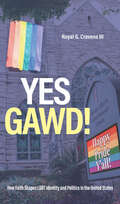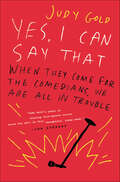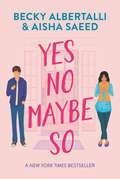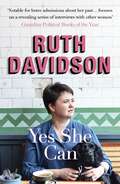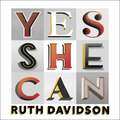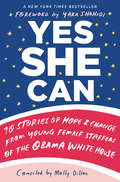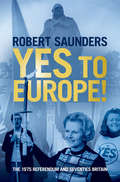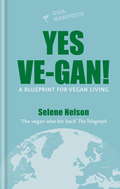- Table View
- List View
The Years of Anger: The Life of Randall Swingler (Routledge Studies in Radical History and Politics)
by Andy CroftRandall Swingler (1909–67) was arguably the most significant and the best-known radical English poet of his generation. A widely published poet, playwright, novelist, editor and critic, his work was set to music by almost all the major British composers of his time. This new biography draws on extensive sources, including the security services files, to present the most detailed account yet of this influential poet, lyricist and activist. A literary entrepreneur, Swingler was founder of radical paperback publishing company Fore Publications, editor of Left Review and Our Time and literary editor of the Daily Worker; later becoming a staff reporter, until the paper was banned in 1941. In the 1930s, he contributed several plays for Unity Theatre, including the Mass Declamation Spain, the Munich play Crisis and the revues Sandbag Follies and Get Cracking. In 1936, MI5 opened a 20-year-long file on him prompted by a song he co-wrote with Alan Bush for a concert organised to mark the arrival of the 1934 Hunger March into London. During the Second World War, Swingler served in North Africa and Italy and was awarded the Military Medal for his part in the battle of Lake Comacchio. His collections The Years of Anger (1946) and The God in the Cave (1950) contain arguably some of the greatest poems of the Italian campaign. After the war, Swingler was blacklisted by the BBC. Orwell attacked him in Polemic and included him in the list of names he offered the security services in 1949. Stephen Spender vilified him in The God That Failed. The book will challenge the Cold War assumptions that have excluded Swingler’s life and work from standard histories of the period and should be of great interest to activists, scholars and those with an interest in the history of the literary and radical left.
Years Of Hope: Diaries, Letters and Papers 1940-1962
by Tony BennYEARS OF HOPE is a kind of 'prequel' to the published series of DIARIES, and will cover fully the peerage renunciation, as well as revealing his early career, touching on schooldays, RAF service during the war, early involvement with politics etc. As a young man he had dealings with Atlee, Bevan, Morrison, Gaitskill and all the major politicians of the post-war Labour Government. This book will be more personal than earlier volumes and will draw on letters and other documents as well as the DIARIES themselves. It will reveal the extraordinary consistency of Benn's political views, as well as showing how he came to acquire them.
The Years of Progress
by R. W. Davies Oleg Khlevnyuk Stephen G. WheatcroftBased on extensive research in formerly secret archives, this volume examines the progress of Soviet industrialisation against the background of the rising threat of aggression from Germany, Japan and Italy, and the consolidation of Stalin's power.
Years of Renewal
by Henry KissingerPerhaps the best-known American diplomatist of the twentieth century, Henry Kissinger is a major figure in world history, winner of the Nobel Peace Prize, and arguably one of the most brilliant minds ever placed at the service of American foreign policy, as well as one of the shrewdest, best-informed, and most articulate men ever to occupy a position of power in Washington. The eagerly awaited third and final volume of his memoirs completes a major work of contemporary history. It is at once an important historical document and a brilliantly told narrative of almost Shakespearean intensity, full of startling insights, unusual (and often unsparing) candor, and a sweeping sense of history. Years of Renewal is the triumphant conclusion of a major achievement and a book that will stand the test of time as a historical document of the first rank.
Yeats, Eliot, Pound and the Politics of Poetry: Richest to the Richest (Routledge Library Editions: T. S. Eliot #2)
by Cairns Prof. CraigIt has long been recognised that there is an apparently paradoxical relationship between the revolutionary poetic style developed by Yeats, Eliot and Pound in the period during and after the First World War, and the reactionary politics with which they were associated in the 1920s and 1930s. Concentrating on their writings in the period up to the 1930s, this study, first published in 1982, helps to resolve the paradox and also provides a much needed reappraisal of the factors influencing their poetic and political development. The work of these poets has usually been seen as deriving from the tradition of continental symbolist poetics. Yeats, Eliot, Pound and the Politics of Poetry will be of interest to students of literature.
Yeh-shen: A Cinderella Tale from China
by Joanna Korba Tom Sperling Jeffrey FuerstPerform this Cinderella tale from China.
The Yellow Journalism: The Press and America's Emergence as a World Power
by David R. SpencerWhen a case containing dismembered human remains surfaced in New York's East River in June of 1897, the publisher of the New York Journal--a young, devil-may-care millionaire named William Randolph Hearst--decided that his newspaper would "scoop" the city's police department by solving this heinous crime. Pulling out all the stops, Hearst launched more than a journalistic murder investigation; his newspaper's active intervention in the city's daily life, especially its underside, marked the birth of the Yellow Press. <p><p>In a work that studies the rise and fall of this phenomenon, David R. Spencer documents the fierce competition that characterized yellow journalism, the social realities and trends that contributed to its success (and its ultimate demise), its accomplishments for good or ill, and its long-term legacy. Most notable among Hearst's competitors was New York City's The World, owned and managed by a European Jewish immigrant named Joseph Pulitzer. The Yellow Journalism describes how these two papers and others exploited the scandal, corruption, and crime among the city's most influential citizens, and its most desperate inhabitants--a policy that made this "journalism of action" remarkably effective, not just as a commercial force, but also as an advocate for the city's poor and defenseless. <p><p>Spencer shows how many of the innovations first introduced during this period--from investigative reporting to the use of color, entertainment news, and cartoons in papers--have had a lasting effect on journalism; and how media in our day reflects the Yellow Press's influence, but also its threatened irrelevance within the broader realities of contemporary society.
The Yellow Pad: Making Better Decisions in an Uncertain World
by Robert E. RubinRobert Rubin, former secretary of the Treasury and co-chairman of Goldman Sachs, shares thoughts on decision-making developed over more than six decades in markets, business, government, and politics, and offers readers an astute and original guide for navigating uncertain timesIn 1958, as a college sophomore, Robert Rubin took a class that changed his life. The class was introduction to philosophy, and the professor, Raphael Demos, instilled in his students an idea that was simple yet profound: There is no such thing as certainty. For Rubin, this led to a critically important question: How can we make sound decisions in a fundamentally uncertain world?While serving in some of the most significant roles in markets, business, and government, Rubin has grappled with that question. Time and again, when faced with a high-stakes decision, he turned to his most trusted tool: a simple yellow legal pad. Rubin&’s yellow pad (or more recently, his iPad) became an expression of a larger decision-making philosophy that has both lasted and shaped a lifetime. In The Yellow Pad, Rubin lays out that philosophy with depth and detail, and presents a compelling intellectual framework for confronting some of the most difficult issues we face today.The Yellow Pad contains a former Treasury secretary&’s approach to economic policymaking. A former Goldman Sachs senior partner&’s approach to personal investing and understanding risk. A former director of the National Economic Council&’s approach to managing people in both private- and public-sector organizations. And much more. Yet despite his lifetime of experiences, Rubin remains refreshingly open-minded, interested in exploring ideas rather than promoting ideologies. With its combination of wisdom and relevance, The Yellow Pad is an essential guide for anyone looking to make better decisions in life, work, and public policy.
The Yellow Star: The Legend of King Christian X of Denmark
by Carmen Agra Deedy Henri SorensenWithout the yellow star to point them out, the Jews looked like any other Danes. For centuries, the Star of David was a symbol of Jewish pride. But during World War II, Nazis used the star to segregate and terrorize the Jewish people. Except in Denmark. When Nazi soldiers occupied his country, King Christian X of Denmark committed himself to keeping all Danes safe from harm. The bravery of the Danes and their king during that dangerous time has inspired many legends. The most enduring is the legend of the yellow star, which symbolizes the loyalty and fearless spirit of the king and his people. Award-winning author and storyteller Carmen Deedy has poignantly recreated this legend, which is accompanied by Danish illustrator Henri Sørensen's arresting full-color portraits. The result is a powerful and dignified story of heroic justice, a story for all people and all times.
Yellow Star, Red Star: Holocaust Remembrance after Communism
by Jelena SubotićYellow Star, Red Star asks why Holocaust memory continues to be so deeply troubled—ignored, appropriated, and obfuscated—throughout Eastern Europe, even though it was in those lands that most of the extermination campaign occurred. As part of accession to the European Union, Jelena Subotić shows, East European states were required to adopt, participate in, and contribute to the established Western narrative of the Holocaust. This requirement created anxiety and resentment in post-communist states: Holocaust memory replaced communist terror as the dominant narrative in Eastern Europe, focusing instead on predominantly Jewish suffering in World War II. Influencing the European Union's own memory politics and legislation in the process, post-communist states have attempted to reconcile these two memories by pursuing new strategies of Holocaust remembrance. The memory, symbols, and imagery of the Holocaust have been appropriated to represent crimes of communism.Yellow Star, Red Star presents in-depth accounts of Holocaust remembrance practices in Serbia, Croatia, and Lithuania, and extends the discussion to other East European states. The book demonstrates how countries of the region used Holocaust remembrance as a political strategy to resolve their contemporary "ontological insecurities"—insecurities about their identities, about their international status, and about their relationships with other international actors. As Subotić concludes, Holocaust memory in Eastern Europe has never been about the Holocaust or about the desire to remember the past, whether during communism or in its aftermath. Rather, it has been about managing national identities in a precarious and uncertain world.
The Yellow Wall-paper, Herland, and Selected Writings
by Charlotte Perkins GilmanWonderfully sardonic and slyly humorous, the writings of landmark American feminist and socialist thinker Charlotte Perkins Gilman were penned in response to her frustrations with the gender-based double standard that prevailed in America as the twentieth century began. Perhaps best known for her chilling depiction of a woman's mental breakdown in her unforgettable 1892 short story 'The Yellow Wall-Paper', Gilman also wrote Herland, a wry novel that imagines a peaceful, progressive country from which men have been absent for 2,000 years. Both are included in this volume, along with a selection of Gilman's major short stories and her poems.
Yeltsin: A Life
by Timothy J. ColtonEven after his death in April 2007, Boris Yeltsin remains the most controversial figure in recent Russian history. Although Mikhail Gorbachev presided over the decline of the Communist party and the withdrawal of Soviet control over eastern Europe, it was Yeltsin-Russia’s first elected president-who buried the Soviet Union itself. Upon taking office, Yeltsin quickly embarked on a sweeping makeover of newly democratic Russia, beginning with a program of excruciatingly painful market reforms that earned him wide acclaim in the West and deep recrimination from many Russian citizens. In this, the first biography of Yeltsin’s entire life, Soviet scholar Timothy Colton traces Yeltsin’s development from a peasant boy in the Urals to a Communist party apparatchik, and then ultimately to a nemesis of the Soviet order. Based on unprecedented interviews with Yeltsin himself as well as scores of other Soviet officials, journalists, and businessmen, Colton explains how and why Yeltsin broke with single-party rule and launched his drive to replace it with democracy. Yeltsin’s colossal attempt to bring democracy to Russia remains one of the great, unfinished stories of our time. As anti-Western policies and rhetoric resurface in Putin’s increasingly bellicose Russia, Yeltsin offers essential insights into the past, present, and future of this vast and troubled nation.
Yemen: Dancing on the Heads of Snakes
by Victoria ClarkYemen is the dark horse of the Middle East. Every so often it enters the headlines for one alarming reason or another--links with al-Qaeda, kidnapped Westerners, explosive population growth--then sinks into obscurity again. But, as Victoria Clark argues in this riveting book, we ignore Yemen at our peril. The poorest state in the Arab world, it is still dominated by its tribal makeup and has become a perfect breeding ground for insurgent and terrorist movements. Clark returns to the country where she was born to discover a perilously fragile state that deserves more of our understanding and attention. On a series of visits to Yemen between 2004 and 2009, she meets politicians, influential tribesmen, oil workers and jihadists as well as ordinary Yemenis. Untangling Yemen's history before examining the country's role in both al-Qaeda and the wider jihadist movement today, Clark presents a lively, clear, and up-to-date account of a little-known state whose chronic instability is increasingly engaging the general reader.
Yemen: Poverty and Conflict (The Contemporary Middle East)
by Helen LacknerFocusing on the fundamental reasons underlying the lasting crisis of the Yemeni Civil War, this book frames contemporary Yemen and assesses prospects beyond the conflict, identifying the factors which will determine its future internal and international characteristics. Building on Helen Lackner’s profound experience in Yemen, this volume discusses Yemen’s history and state formation, the main political institutions emerging since the Republic of Yemen was established and their role in the war, including the significance of current fragmentation. The volume goes on to discuss climate change, including the water scarcity issue, in the context of resource constraints to economic development and the role of migration. Rural and urban life, as well as the impact of international development and humanitarian aid, are also covered, together with Yemen’s international relations – its interaction with its neighbours as well as Western states. Looking forward, it suggests the type of policies able to give Yemenis the conditions needed for a reasonable standard of living. Thanks to analysis of determining events, the book will appeal to politicians, diplomats, humanitarian organizations, security analysts, researchers on the Middle East and those generally interested in Yemen. It will also be an essential text for students of international relations, political economy, failing states, development studies and contemporary Middle Eastern history.
Yemen in Crisis: Road to War
by Helen LacknerExpert analysis of Yemen's social and political crisis, with profound implications for the fate of the Arab World The democratic promise of the 2011 Arab Spring has unraveled in Yemen, triggering a disastrous crisis of civil war, famine, militarization, and governmental collapse with serious implications for the future of the region. Yet as expert political researcher Helen Lackner argues, the catastrophe does not have to continue, and we can hope for and help build a different future in Yemen.Fueled by Arab and Western intervention, the civil war has quickly escalated, resulting in thousands killed and millions close to starvation. Suffering from a collapsed economy, the people of Yemen face a desperate choice between the Huthi rebels on the one side and the internationally recognized government propped up by the Saudi-led coalition and Western arms on the other. In this invaluable analysis, Helen Lackner uncovers the roots of the social and political conflicts that threaten the very survival of the state and its people. Importantly, she argues that we must understand the roots of the current crisis so that we can hope for a different future for Yemen and the Middle East.With a preface exploring the US’s central role in the crisis.
The Yemen Model: Why U.S. Policy Has Failed in the Middle East
by Alexandra StarkA close look at failed U.S. policies in the Middle East, offering a fresh perspective on how best to reorient goals in the region In this book Alexandra Stark argues that the U.S. approach to Yemen offers insights into the failures of American foreign policy throughout the Middle East. Stark makes the case that despite often being drawn into conflicts within Yemen, the United States has not achieved its policy goals because it has narrowly focused on counterterrorism and regional geopolitical competition rather than on the well-being of Yemenis themselves. She offers recommendations designed to reorient U.S. policy in the Middle East in pursuit of U.S. national security interests and to support the people of these countries in their efforts to make their own communities safe, secure, and prosperous.
Yemen on the Brink
by Christopher Boucek Marina OttawayYemen is facing a unique confluence of crises. A civil war in the North, a secessionist movement in the South, and a resurgence of al Qaeda are unfolding against the background of economic collapse, insufficient state capacity, and governance and corruption issues.The security challenges are the most important in the short run, because economic and governance issues cannot be addressed without a minimum of stability. This volume brings together analyses of the critical problems that have dragged Yemen close to state failure. It provides an assessment of Yemen's major security challenges by recognized experts, and it broadens the discussion of the tools available to the international community to pull Yemen back from the brink. Separate chapters examine the resurgence of al Qaeda in the Arabian Peninsula, the complex relationship between al Qaeda and the Yemini tribes, the Southern secessionist movement, and the civil war in Saada.Contents include Yemen: Avoiding a Downward Spiral What Comes Next in Yemen? Al-Qaeda, the Tribes, and State-Building The Political Challenge of Yemen's Southern Movement War in Saada: From Local Insurrection to National Challenge Instrumentalizing Grievances: Al-Qaeda in the Arabian PeninsulaContributors include Sarah Phillips (Centre for International Security Studies, University of Sydney), Stephen Day (Rollins College), and Alistair Harris (RUSI and former diplomat and UN staff member).
Yes Gawd!: How Faith Shapes LGBT Identity and Politics in the United States (Religious Engagement in Democratic Politics)
by Royal G. Cravens IIIYes Gawd! explores the effects of religious belief and practice on political behavior among the LGBT community, a population long persecuted by religious institutions and generally considered to be non-religious. Royal Cravens deftly shows how faith impacts the politics of LGBT people. He details how the queer community creates, defines, and experiences spirituality and spiritual affirmation as well as the consequences this has for their identity, socialization, and political development. Cravens also demonstrates the mobilizing power of faith for LGBT people by contrasting the effects of participation in faith and secular communities on political activism. He explores how factors such as coming out, race, and LGBT-affirming churches influence political attitudes and behavior and explains how the development of LGBT politico-religious activism provides opportunities for LGBT people to organize politically. Ultimately, Cravens provides a cohesive account of how religion acts as a catalyst for and facilitator in the political development of LGBT people in the United States. In the process, he shows that there is room for both religion in LGBT communities and LGBT people in religious communities.
Yes, I Can Say That: When They Come for the Comedians, We Are All in Trouble
by Judy Gold"No one makes me laugh harder than Judy Gold. If I had to pick one comedian to write a book about free speech, it would be Judy." – Amy SchumerFrom award-winning comedian Judy Gold, a concise, funny, and thoughtful polemic on the current assault on comedy, that explores how it is undermining free speech and a fundamental attack against the integrity of the art.From Mae West and Lenny Bruce to Richard Pryor and Howard Stern to Kathy Griffith and Kevin Hart, comedians have long been under fire for using provocative, often taboo subjects to challenge mores and get a laugh. But in the age of social media, comedians are at greater risk of being silenced, enduring shaming, threats, and damaged careers because of angry, censorious electronic mobs. But while comedians’ work has often been used to rile up detractors, a new threat has emerged from the left: identity politics and notions like "safetyism" and trigger warnings that are now creating a cultural and political standard that runs perilously close to censorship. From college campuses to the Oscars, comics are being censured for old jokes, long-standing comedy traditions, unfinished bits and old material that instead of being forgotten, go viral. For comics like Judy Gold, today’s attacks on comics would have Richard Pryor and Lenny Bruce "rolling in their graves." "No one has the right to tell comics what they can or cannot joke about. Do you tell artists what they can or cannot paint?" she asks. Freedom of speech is fundamental for great stand-up comedy. Humor is the most palatable way to discuss a subversive or taboo topic, but it better be funny. A comic's observations are deliberately delivered to entertain, provoke, and lead to an exchange of ideas. "We are truth tellers." More important, the tolerance of free speech is essential for a healthy democracy.In addition to offering readers a quick study on the history of comedy and the arts (noting such historical reference points as The Hays Code) and the threats to them, Gold takes readers on a hilarious ride with chapters such as "Thank God Don Rickles is Dead," as well as her singular take on "micro-aggressions," such as:Person: "OMG! You’re a lesbian? I had no idea. I mean you wear make-up. When did you become a lesbian?"Judy Gold: "Coincidently, right after I met you!" (micro-assault!)In this era of "fake news," partisan politics, and heated rhetoric, the need to protect free speech has never been greater, especially for comics, who often serve as the canaries in the coalmine, monitoring the health of our democracy. Yes I Can Say That is a funny and provocative look at how safe spaces are the very antithesis of comedy as an art form—and an urgent call to arms to protect our most fundamental Constitutional right. There's a good reason it was the FIRST amendment.
Yes No Maybe So
by Aisha Saeed Becky AlbertalliYES <p><p> Jamie Goldberg is cool with volunteering for his local state senate candidate—as long as he’s behind the scenes. When it comes to speaking to strangers (or, let’s face it, speaking at all to almost anyone) Jamie’s a choke artist. There’s no way he’d ever knock on doors to ask people for their votes…until he meets Maya. <p> NO <p> Maya Rehman’s having the worst Ramadan ever. Her best friend is too busy to hang out, her summer trip is canceled, and now her parents are separating. Why her mother thinks the solution to her problems is political canvassing—with some awkward dude she hardly knows—is beyond her. <p> MAYBE SO <p> Going door to door isn’t exactly glamorous, but maybe it’s not the worst thing in the world. After all, the polls are getting closer—and so are Maya and Jamie. Mastering local activism is one thing. Navigating the cross-cultural crush of the century is another thing entirely.
Yes She Can: Why Women Own The Future
by Ruth Davidson'Modern, punchy and fresh' Sunday Times'A positive and fascinating read' Stylist 'A collection of unexpectedly revealing interviews with "mould-breaking women"... This optimistic volume also includes an intimate memoir from Davidson herself' Guardian ******************************************************************The woman who trains Indian special forces in armed and unarmed combat, the IMF Chair, the UK's most capped footballer, a dotcom millionaire, the BBC's first female political editor, a member of the Royal Household, an eminent forensic scientist, an Olympic gold-medallist, a prime minister... this book is for every daughter, every mother, every aunt and every niece, as eighteen of the world's mould-breaking women share the life lessons they've learned. Every single one of them has shown that yes, she can. Revealing, enthralling, informing, in Yes She Can Ruth Davidson weaves her own inspiring journey with these personal stories into a timely rallying call for generations to come.
Yes She Can: Why Women Own The Future
by Ruth DavidsonLeader of the Scottish Conservatives Ruth Davidson gleans life lessons learned by inspirational women from around the world in a personal and inspirational book.In Ruth Davidson's YES SHE CAN we meet world-beating women from fields as diverse as science, politics, the military, business and sport. They share their own journeys to the top - whether that's becoming Prime Minister, winning an Olympic gold medal or teaching male special forces how to fight. They share the bad times too, the challenges faced and difficulties to hurdle, explaining what they've learned along the way. We also see the author's own path as she tracks the societal shifts that have seen women advance - and discuss how far we've still got to go. Revealing, inspiring, informing, YES SHE CAN takes personal stories and deftly weaves them into an equalities manifesto for the modern age, a timely rallying call to make the life lessons of this book a reality for generations to come.(P)2018 Hodder & Stoughton Limited
Yes She Can: 10 Stories of Hope & Change from Young Female Staffers of the Obama White House
by Molly DillonReturn to President Obama's White House in this anthology for young women by young women, featuring stories from ten inspiring young staffers who joined his administration in their 20s with the hope of making a difference. <P><P>Includes a foreword by actress (Grown-Ish) and activist Yara Shahidi! Shahidi is the creator of Eighteen x '18, a platform to empower first-time voters. <P><P>They were teens when Barack Obama announced he was running for president. <P><P>They came of age in the Obama Era. <P><P>And then they joined his White House. Smart, motivated, ambitious--and ready to change the world. <P><P>Kalisha Dessources Figures planned one of the biggest summits held by the Obama White House--The United State of Women. <P><P> Andrea Flores fought for the president's immigration bill on the Hill. <P><P> Nita Contreras traveled the globe and owned up to a rookie mistake on Air Force One (in front of the leader of the free world!). <P><P>Here are ten inspiring, never-before-told stories from diverse young women who got. Stuff. Done. They recall--fondly and with humor and a dose of humility--what it was like to literally help run the world. <P><P>YES SHE CAN is an intimate look at Obama's presidency through the eyes of some of the most successful, and completely relatable, young women who were there. <P><P>Full of wisdom they wish they could impart to their younger selves and a message about the need for more girls in government, these recollections are about stepping out into the spotlight and up to the challenge--something every girl can do. <P><P>With contributions from Jenna Brayton, Eleanor Celeste, Nita Contreras, Kalisha Dessources Figures, Molly Dillon, Andrea R. Flores, Vivian P. Graubard, Noemie C. Levy, Taylor Lustig, and Jaimie Woo. <P><b>A New York Times Bestseller</b>
Yes to Europe!: The 1975 Referendum and Seventies Britain
by Robert SaundersOn 5 June 1975, voters went to the polls in Britain's first national referendum to decide whether the UK should remain in the European Community. As in 2016, the campaign shattered old political allegiances and triggered a far-reaching debate on Britain's place in the world. The campaign to stay in stretched from the Conservative Party - under its new leader, Margaret Thatcher - to the Labour government, the farming unions and the Confederation of British Industry. Those fighting to 'Get Britain Out' ranged from Enoch Powell and Tony Benn to Scottish and Welsh nationalists. Footballers, actors and celebrities joined the campaign trail, as did clergymen, students, women's groups and paramilitaries. In a panoramic survey of 1970s Britain, this volume offers the first modern history of the referendum, asking why voters said 'Yes to Europe' and why the result did not, as some hoped, bring the European debate in Britain to a close.
Yes Ve-gan!: A blueprint for vegan living (Gaia Manifestos)
by Selene NelsonThe rise of veganism is impossible to ignore - for full time practitioners and those wanting to experiment with a more planet-friendly lifestyle. In Yes-Vegan! Selene breaks down the burning questions surrounding veganism from choice, ethics, ecology to fitness, health & beauty as well as providing informed opinions on just how to rebuff the haters. "With regards to veganism, as long as you arm yourself with some key facts and remain calm, there really is nothing to worry about - even if you're someone who hates conflict. After this book, not only will you be able to answer each and every question posed to you, but you can then follow up with a few insightful questions of your own that will get the other person thinking." - Selene Nelson "This book will open your mind" - Julie MontaguChapters include: My Vegan JourneyThe FactsStarting OutVegan LifeTaking it FurtherFour Weeks to Vegan
